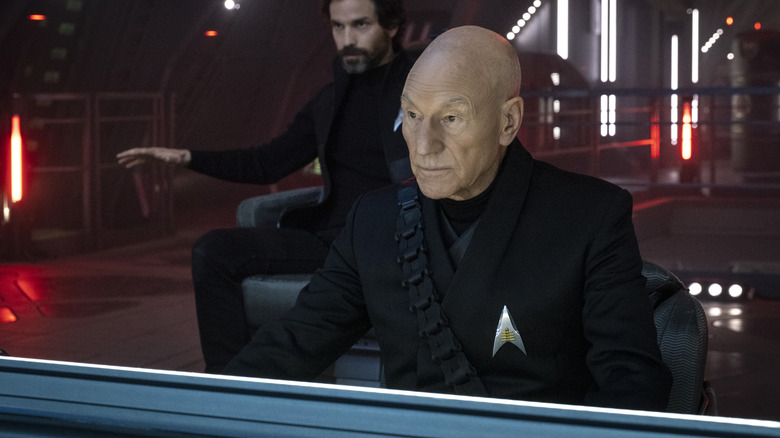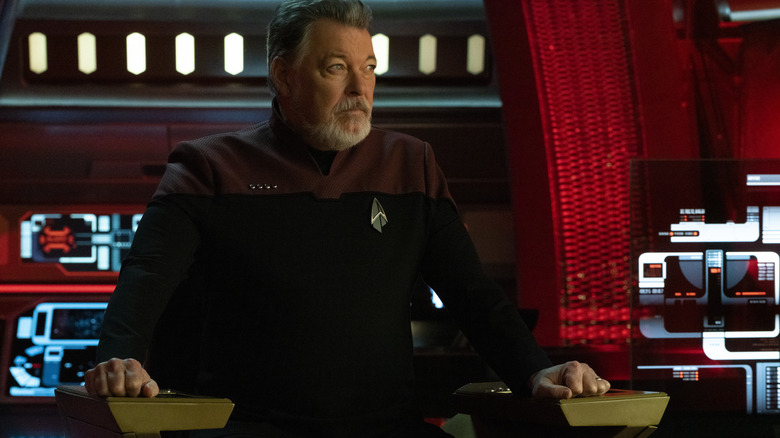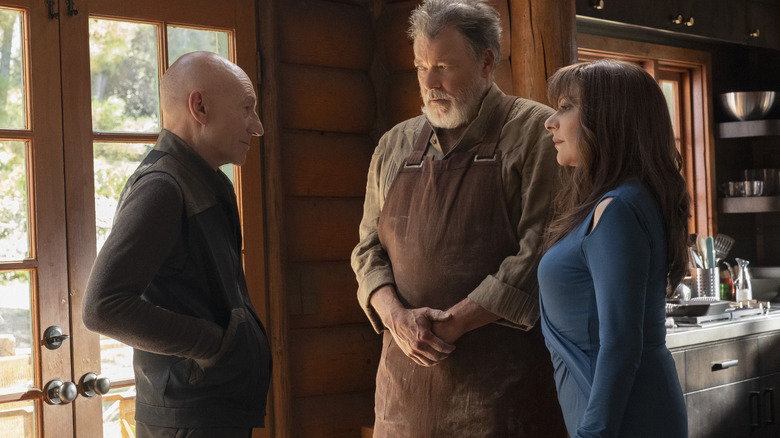Jonathan Frakes Thinks Picard's Terry Matalas Adds Something To Star Trek That Gene Roddenberry Rarely Did
Television writer Terry Matalas began his professional career in "Star Trek," having worked as a production assistant and story writer for "Enterprise" in 2003. He would go on to be the story editor for the assassin show "Nikita," and the developer for the TV series "12 Monkeys." He returned to Trek in 2020 by becoming the showrunner on the second season of "Star Trek: Picard," a position he would hold into the show's filmed-but-as-yet-unreleased third season. He also serves as one of the show's many, many executive producers.
The third season of "Picard" is hotly anticipated, as it will feature a reunion of Patrick Stewart with Jonathan Frakes, Marina Sirtis, Michael Dorn, Gates McFadden, Brent Spiner, and LeVar Burton. It will be the first time the central cast of "Star Trek: The Next Generation" will have been on screen together since the conclusion of "Star Trek: Nemesis" in 2002.
Trekkies might find themselves cautiously curious about the reunion. Catching up with familiar characters may provide a certain kind of nostalgic thrill, but "Star Trek: The Next Generation" and "Star Trek: Picard" are very, very different shows. The former was produced in the late 1980s and 1990s, and featured character-centric, standalone episodes that dealt with crises or philosophical problems. It took place on the Enterprise, and the characters adhered to a traditional command structure. "Picard," in contrast, has featured two season-long story arcs that each united a loose-knit group of roguish, violent friends who took to cities and vineyards to solve oblique mysteries while out of uniform and beholden to no one. It's a "Star Trek" show that only tangentially involves Starfleet.
What Trek is really about
In a recent interview with Den of Geek, Frakes mentioned that Matalas, despite working on a very different kind of "Star Trek" show, seems to profoundly understand what Trek is all about. Of course "what Trek is all about" is expansive and even debatable, but Frakes and Matalas certainly seem to have fallen in line. Notably, the actor finds it refreshing that the upcoming reunion is not going to be mere warm reminiscences, but interpersonal conflict. This makes sense, as Frakes and Sirtis have already appeared in the first season of "Picard." Still in contact, Picard and Riker (Frakes) would now have leeway to argue. He liked that, and praised Matalas thus:
"He really gets Next Gen. Without blowing too much smoke up Terry's ass, he's a wonderful writer. And the stuff he gave me to do was exciting. I know that Gates felt the same way, and I think LeVar did, too [...] Terry wrote Riker in conflict with Picard, which I thought was quite exciting."
The idea of drama via interpersonal conflict was, as many Trekkies know, strictly verboten in the early days of the "Next Generation" writers room. Show creator Gene Roddenberry even had an unofficial rule that the show's drama had to stem from external forces only. On the Enterprise, people always work together smoothly, and their personal feelings about one another would be put aside when they were on the clock. Many Trek writers found the Roddenberry Rule to be incredibly frustrating, preferring to tell stories of "conflicts overcome" and of character growth via rocky interactivity.
Roddenberry's rule had been actively abandoned in 2017 upon the launch of "Star Trek: Discovery."
Roddenberry's Rule
Any textbook or beginner's writing manual will likely start with instructions on how to include conflict into a fictional tale. It's a long-held belief that story can only arise where conflict in present. Some instructors have even boiled story down into only a few different kinds of conflict, leading to broad theses that there are, indeed, only three kinds of story (person vs. person, person vs. nature, person vs. self, etc.). Roddenberry encouraged a kind of storytelling that never included person vs. person conflicts. His milieu was from a matured standpoint, and his shows often featured characters who were already grown up.
Frakes argues that Roddenberry had failed to acknowledge that even grown characters would butt heads occasionally. Frakes seemed relieved that Matalas allowed such head-butting to finally take place, saying:
"Roddenberry was, for some reason, opposed to conflict [...] It was a peculiar ask back in the day, but he wanted everyone to get along. Not so much with Terry. He's really stirred the pot. Conflict, which, as we know, is an absolute necessity in drama."
The nature of the conflict between a 100-year-old Picard and an 80-year-old Riker remains to be discovered — the third season of "Picard" will debut on February 16, 2023 — although both of them enjoyed long careers as Starfleet captains, so one might assume it to be about their differing command styles; Picard was always stern, Riker jocular. It will also be interesting to see how characters, now mostly in their 90s (by Trek's chronology) will rekindle their relationships.
As mentioned above, Trekkies approach with cautious curiosity.


